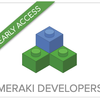Turn on suggestions
Auto-suggest helps you quickly narrow down your search results by suggesting possible matches as you type.
Become a member of the Cisco Meraki Community today
Get answers from our community of experts in record time.
Join now- About ibrugnolli
About ibrugnolli
ibrugnolli
Comes here often
Member since May 7, 2024
May 13 2025
Community Record
7
Posts
0
Kudos
0
Solutions
Badges
May 29 2024
9:56 AM
Webhook support for Meraki Insight seems to be a complete different configuration, when compare with the Webhooks support config in the Organization->Configure->API and Webhook. In the config page for Insight Webhooks there is no support for templates. Are there any plans to add template support to the Insight Webhook config in the same way as currently exists in Organization->Configure->API and Webhook ? Are there any plans to integrate Insight Webhook configuration with the Organization->Configure->API and Webhook ?
... View more
May 29 2024
9:55 AM
Webhook support for Meraki Insight seems to be a complete different configuration, when compare with the Webhooks support config in the Organization->Configure->API and Webhook. In the config page for Insight Webhooks there is no support for templates. Are there any plans to add template support to the Insight Webhook config in the same way as currently exists in Organization->Configure->API and Webhook ? Are there any plans to integrate Insight Webhook configuration with the Organization->Configure->API and Webhook ?
... View more
May 27 2024
9:13 AM
The Meraki sizing tool says that the MA-SFP-10GB-LRM is supported on the MS130X
... View more
May 27 2024
9:05 AM
I know the document URL I posted does not show the MA-SFP-10GB-LRM as supported. But the Meraki Sizing tool says this MS130X support this transceiver model https://merakisizing.com/#/ms That´s why I am asking
... View more
May 27 2024
8:16 AM
Hi, On the following meraki documentation: https://documentation.meraki.com/General_Administration/Cross-Platform_Content/Small-Form_Factor_Pluggable_(SFP)_and_Stacking_Accessories The MS130X does appear on the list of supported devices for the transceiver MA-SFP-10GB-LRM. Could confirm if this transceiver is suppoted or not on the MS130X platform ? Best Regards. Ivan Brugnolli
... View more
May 11 2024
7:55 AM
There are some scenarios where customer has larger number of MR's that have to be installed and require SSIDs with WPA2-Enterprise RADIUS authentication. These devices could be spread around different networks, and it becomes an issue to add all of these access points as individual clients in the RADIUS server. Radius Proxy provides an alternative approach to fit this use case. In such situations, a RADIUS proxy can be set up such that instead of adding the access points as individual clients, dashboard IP ranges can be used. https://documentation.meraki.com/MR/Encryption_and_Authentication/RADIUS_Proxy_for_WPA2-Enterprise_SSIDs The RADIUS proxy feature allows for the use of the Meraki cloud as the source of RADIUS Access-Request messages instead of the access points themselves. This means that the RADIUS server should be configured to allowlist the Meraki cloud communication and Backup Meraki cloud communication IP ranges found under Help > Firewall info on the dashboard instead of adding individual access points as clients. You don't need to fully expose your Radius server to the internet. Your Radius server could stay protected behind a NG-FW, you just need to allow UDP port 1812 incoming packets from those specifics IP address sources provides by the Meraki Dashboard (Help > Firewall info) The major problem with this solution is that the regular Radius messages over UDP protocol are not encrypted. So, if the Dashboard supports RadSec, this could solve the confidentiality issue.
... View more
May 8 2024
12:42 PM
Hi, We saw that RADSec support was introduced in MR firmware 30.X, when the MR is the authenticator in the 802.1x process. Do we have any plans to support RadSec for the Radius Proxy option (when the Meraki Cloud is the authenticator) ? Best Regards. Ivan Brugnolli
... View more
© 2026 Cisco Systems, Inc.

